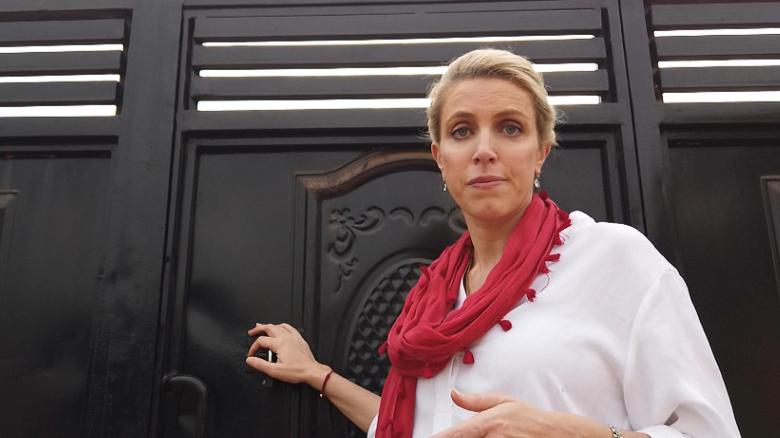
CNN studio
If you are an avid consumer of international news you may have seen the story that Cable News Network aka CNN ran recently about Russian trolls in Ghana and Nigeria. This story is especially relevant for the United States government as it relates to the issue of meddling in its elections by foreign entities. But this news appears to have been drowned out by the ever-increasing flurry of information around the Covid-19 or coronavirus pandemic.
Heavy on international politics and elections, the issue is sure to come back in full force, at least when the coronavirus issue subsides.
Background
The substance of the CNN story is that the Russian government, through an intermediary, is using unsuspecting Africans to help sow discord among Americans ahead of the 2020 U.S. presidential race. How they are doing this, the story says, is through troll factories in Ghana, as well as in Nigeria, run by a Ghanaian, Seth Wiredu, who is disguised as a South African businessman or “Mr. Amara.”
The troll factories Mr. Amara is running, according to CNN, recruited and trained Ghanaians and Nigerians in those countries, to use social media to ferment discord among Americans. The report said this appears to mimic similar tactics used by the Russian government to influence the 2016 presidential race. Reporter Clarissa Ward said they had been investigating the matter for months, which led to the report that aired on many networks of CNN.
I found a couple of interesting things about the story, which is the subject of this writing.
Good Journalism
Like journalism, the story appears to be a major journalistic scoop for CNN. It was the first time I heard about it, even though it seems the Ghanaian government, earlier on, had raided the place where Mr. Amara and his employees were based. That activity may have made the news rounds in Ghana but never rose to the level where it was a major international headline story. It was only after the CNN story aired that other news organizations in the United States began to quickly recycle it.
On one level it was an enterprising piece from one of the best journalism organizations in the world today. As I began to check this out I noticed Vox had a story in 2019 about Moscow’s plan to interfere in the 2020 Elections via trolls in the African continent.
Community Work
The difference is that reporters from CNN traveled to Accra, the Ghanaian capital, and with others on the ground in Lagos, Nigeria, they made the effort to check things out for themselves.
CNN was on the ground, talking to Ghanaians about what they knew about the business Mr. Amara was running. They contacted and interviewed an employee from the non-profit organization Mr. Amara had created to pursue his activities, Eliminating Barriers for the Liberation of Africa or EBLA, to learn more about it. CNN masked the identity of someone they interviewed, for fear of what may happen to them afterward. The many revelations of the story make it striking and an interesting discussion about the work CNN is good at doing – investigative journalism.
Questionable Ethics
On another level, the story appeared like an ambush, a tactic that journalists sometimes use to obtain information. It is reminiscent of the same tactics NBC News used when it tried to track down sexual predators with the series To Catch a Predator, led by journalist Chris Hansen. As part of the Dateline NBC program, Hansen and his producers partnered with the anti-predator organization Perverted Justice to set up sex sting operations in which members of the group posed as teenagers online.
They used NBC News cameras to nab and expose the people who fell into the trap they set up. The show, which saw many spin-offs, led some of its victims into committing suicide while it was implicated in lawsuits. The program was heavily criticized by rival TV networks, including ABC News. It was later canceled by NBC News in 2008.
This kind of tactic may go unnoticed by viewers who do not understand or care much about how news organizations obtain their information, except for how the story impacts them.
Russia and US Elections
On the question of Russian meddling in U.S. elections, emotions have run wild and will continue to run wild, no doubt, because of the deeper repercussions of such foreign activity on the core of American democracy.
As CNN pursued this story, reporter Ward said they used a hidden camera as they tried to track down Mr. Amara’s activities. Which begs the question: why didn’t CNN advise the person they were investigating that they wanted to talk to him? The story does not tell us why they chose to use a hidden camera. Doesn’t it make sense to request a courteous sit-down interview with your main subject when you are trying to obtain information? Instead, what we see from Ward is a public display of intimidation, disrespect, and a snobbish attitude when she confronted Mr. Amara on the streets of Accra. Good journalism requires journalists to do their job properly.
One thing we have to remember is that while there is investigative journalism, which searches for the truth using sometimes very risky mechanisms, journalists, by their very nature, are not law enforcement people. This makes the CNN tactic questionable.
African Stereotypes
But even more troubling is the reinforcement of an African stereotype we’ve often seen when it comes to stories that deal with a crime involving people from the African continent, Nigerians and Ghanaians especially. We’ve seen news stories in American media featuring Ghanaians and Nigerians associated with crime, topping the evening news, and leading to the automatic suspect of people from these African nations.
While the essence of the story itself, the idea that Russia is prepared to once again interfere in American elections, and that they have found a safe place with an unsuspecting group of Africans to help them may have teeth, the CNN team failed to offer proper courtesy to Mr. Amara to hear fully what he may have to say. This courtesy is needed, whether you are rag-tag criminal hiding in Accra, Ghana, or a millionaire and a criminal on Wall Street.
The Trump Administration’s Abandonment of Africa
The issue of Russia’s presence; its economic and political influence within the African continent, noted in the story, raises plenty of concerns. While Russia and China have gained a foothold there over the last decade, it is the United States, under the Trump administration, which appears to have abandoned the continent entirely. This perspective has been missed by many in the U.S. news establishment. This may account for why the Russians are now able to easily infiltrate these vulnerable nations and use their citizens as weapons against America.

